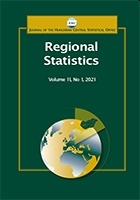Local investment promotion in a Hungarian medium-sized town and the implications of the COVID pandemic
Katalin Antalóczy – Imre Birizdó – Magdolna Sass
Regional Statistics, Vol. 12. No. 1. 2022 – online first publication date: 20 December 2021
 Tatabánya has been among the most successful Hungarian towns in attracting foreign direct investment (FDI), which now plays a determining role in its economy. Can already operating, foreign-owned firms, along with the attraction of new firms alleviate the negative economic consequences of the COVID pandemic? What other FDI-related policy options are available for the local government to handle the negative consequences of the crisis? This question is analysed based on publicly available information and interviews taken with representatives of the local government and industrial park. It shows that foreign-owned firms already operating in various industries and coming from numerous countries played a stabilising role during the crisis, especially in the labour market and local tax revenues, mainly because of the large-scale and diverse local FDI. However, this article also shows that local FDI is loosely embedded and shows limited signs of upgrading, thus its positive impact on Hungarian-owned local firms is limited. Further, new FDI projects initiated by non-local players due to the increasingly limited manoeuvring room of local authorities a reassumed to increase the vulnerability of the town’s economy due to their one-sided specialisation and contribution to low levels of embeddedness and upgrading. In addition, they may have negative local environmental and infrastructural impacts. Thus, in handling the negative consequences of the crisis, local authorities cannot rely on attracting new projects, and those attracted by the central agencies have short comings from the point of view of handling the negative consequences of the crisis. Therefore, from the point of view of local authorities, a strategy aimed at increasing the embeddedness of FDI already present and fostering their upgrades may be fruitful.
Tatabánya has been among the most successful Hungarian towns in attracting foreign direct investment (FDI), which now plays a determining role in its economy. Can already operating, foreign-owned firms, along with the attraction of new firms alleviate the negative economic consequences of the COVID pandemic? What other FDI-related policy options are available for the local government to handle the negative consequences of the crisis? This question is analysed based on publicly available information and interviews taken with representatives of the local government and industrial park. It shows that foreign-owned firms already operating in various industries and coming from numerous countries played a stabilising role during the crisis, especially in the labour market and local tax revenues, mainly because of the large-scale and diverse local FDI. However, this article also shows that local FDI is loosely embedded and shows limited signs of upgrading, thus its positive impact on Hungarian-owned local firms is limited. Further, new FDI projects initiated by non-local players due to the increasingly limited manoeuvring room of local authorities a reassumed to increase the vulnerability of the town’s economy due to their one-sided specialisation and contribution to low levels of embeddedness and upgrading. In addition, they may have negative local environmental and infrastructural impacts. Thus, in handling the negative consequences of the crisis, local authorities cannot rely on attracting new projects, and those attracted by the central agencies have short comings from the point of view of handling the negative consequences of the crisis. Therefore, from the point of view of local authorities, a strategy aimed at increasing the embeddedness of FDI already present and fostering their upgrades may be fruitful.


